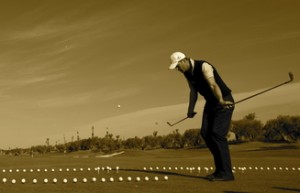
It Don’t Mean A Thing If You Ain’t Got That Swing
Guest Blogger: Jeremy Dale
 Jeremy Dale has performed in over 35 countries as a golf trick-shot artist and competed professionally both right and left-handed. Jeremy is also a PGA coach, TV presenter, and After-Dinner Speaker, and has a degree in Psychology from Sussex University.
Jeremy Dale has performed in over 35 countries as a golf trick-shot artist and competed professionally both right and left-handed. Jeremy is also a PGA coach, TV presenter, and After-Dinner Speaker, and has a degree in Psychology from Sussex University.
Very rarely does a golfer have all parts of their game under control and for many it is a game of strengths and weaknesses. For example, you will know golfers at your club who are brilliant around the greens but cannot reliably find a fairway. Others hit impressive drives but miss hit their wedges or struggle with short pitch shots. Golfers find this very frustrating but fortunately there is a simple explanation.
Your swing PATH is giving your shots a PATTERN
Any error in a golfer’s particular swing path gives a PATTERN of shots – not just one consistent error. Golfers who hook can also push. They are good drivers but tend to hit their irons fat or thin and can get into terrible trouble with chipping and pitching. In some cases this can become the yips. Golfers who slice are the opposite. They slice mostly but can also pull or top the ball. Their driving is poor but their iron play can be fine. Chipping and pitching are ok too but they will often take deep divots. Sound familiar?
Get on the clock! Mirror image path for a straight shot.
 The ideal swing path is nicely illustrated in this photo where you can see both the backswing and follow through are the same. Both clubs are horizontal and also parallel to the target line so the swing is a mirror image. My daughter calls this being ‘’on the clock’’ because the club looks like it is at nine and three o’clock when waist high on both sides of the swing.
The ideal swing path is nicely illustrated in this photo where you can see both the backswing and follow through are the same. Both clubs are horizontal and also parallel to the target line so the swing is a mirror image. My daughter calls this being ‘’on the clock’’ because the club looks like it is at nine and three o’clock when waist high on both sides of the swing.
Trackman studies show that our swing paths are quite consistent but it also means that if you are ‘’off the clock’’ then your path will suit some shots and not others. This creates your strengths and weaknesses.
Good at driving, bad at chipping?
I recently gave one golfer a shock by asking him how his chipping was – after he had done just one practice swing with a driver. He replied instantly…..
‘’I find all chip and short pitch shots utterly impossible……..how can you possibly know that? You haven’t even seen me hit a ball!”
Needless to say, I had his attention. We talked a bit about why this was happening and I said, “You’re probably ok out of bunkers aren’t you?” and he replied that if he was going to miss a green then he always hoped it would go into a bunker so he did not have to pitch over it on his next shot.
How I knew….It is just physics
Well, I ‘’knew’’ because after just one swing I could see he swung on a path that was shallow and ‘’in to out’’. This is great for a driver because we want a sweeping contact – but not so good for a chip or pitch, which both require a slightly descending blow.
The physics of impact has to be the start point for any lesson. We need to know (or find out by experimenting) what the club needs to do to create the desired shot or flight. This is exactly what you would expect in other sports (e.g. learning a top spinner in tennis) but sometimes in golf it gets forgotten.
Bubba Golf! Complete Freedom.
Focusing on what the club needs to do is not really a new idea but in recent times has become known as Bubba Golf, thanks to the success of extreme shot maker Bubba Watson………It is also the best way to learn trick shots!
 It seems to me that complete freedom on the golf course is more likely to come from trying to get the ball to do something – rather than consciously trying to move your body through a series of movements. It is also welcome relief from the endless analysis of all the moving parts of the swing. Bubba learned this long ago and now has two Masters wins to his name. For most however, it can be difficult to give up the security of over controlling swing thoughts and constant swing fixing. In that regard, he is a breath of fresh air.
It seems to me that complete freedom on the golf course is more likely to come from trying to get the ball to do something – rather than consciously trying to move your body through a series of movements. It is also welcome relief from the endless analysis of all the moving parts of the swing. Bubba learned this long ago and now has two Masters wins to his name. For most however, it can be difficult to give up the security of over controlling swing thoughts and constant swing fixing. In that regard, he is a breath of fresh air.
Needless to say, a good coach can point you and your swing in the right direction. Please get in touch if you would like to know more or are interested in improving your golfing skills (email jeremy@jeremydale.com or call 07748 307849).